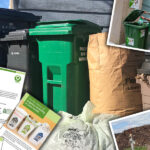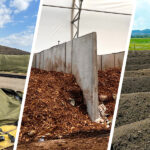Signal Mountain Lodge partnership with farm results in a closed loop for food waste composting in the Grand Tetons.
Ana Carvalho
BioCycle August 2019

Haderlie Farms supplies area food establishments with produce. It started out taking back food scraps to feed its pigs, but then expanded to start WyoFarm, a commercial composting operation. Photos courtesy of Haderlie Farms
Signal Mountain Lodge (Lodge), part of the Forever Resorts group, is located inside Grand Teton National Park in Moran, Wyoming. The Lodge, with 79 guest rooms and 83 campsites, has one main kitchen preparing food for its three restaurants, two coffee shops, and a staff dining room. In addition, the Lodge’s food and beverage service operates a small convenience/grocery store, and a pizzeria about 10 miles north of the Lodge. During the high tourist season, roughly 1,100 meals/day are served to guests, and an additional 480 meals for the 160 staff members on site (three meals/day). During the off-season the numbers drop to about 650 guest meals, and 45 meals/day for the 15 resident staff that remain on site.
Being inside one of the most beautiful national parks in the U.S., the Lodge is very conscious about the environment. It is part of a collaborative partnership with the Subaru of America-sponsored Zero Landfill Initiative in the Grand Teton National Park (GTNP), and the Road to Zero Waste in Teton County. The Lodge’s path to decrease waste sent to the landfill includes a comprehensive commodities recycling program, diversion of grease to pig feed, and donation of labeled-expired packaged food and dented cans to feed people. The food donation program is a partnership with Hole Food Rescue, a City of Jackson food pantry. “We recognized that diverting food waste was a critical component for our goal [to reduce waste], but were faced with the lack of local infrastructure to properly divert it,” explains Erik Kimball, Food & Beverage Director at Signal Mountain Lodge.
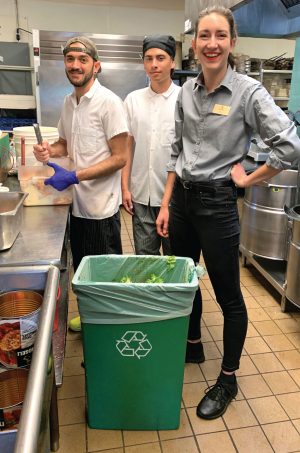
Signal Mountain Lodge began separating food waste for diversion in 2017. Initially, the separated organics were hauled to the West Yellowstone Composting Facility in Montana. Photo courtesy of Signal Mountain Lodge/Erik Kimball
Initial Pilot
In 2017, the Lodge was able to start a pilot program with the only food waste composting facility available — the West Yellowstone Composting Facility (WYCF) — located in the state of Montana, approximately 150 miles away. The hauling cost and tipping fee for this diversion was nearly 200 times more expensive than if the Lodge disposed of the food waste as trash in the closest landfill. However, the Park’s partnership with Subaru of America subsidized most of the costs, making it possible to divert food scraps to composting.
WYCF accepted the food waste in compostable bags. The loads included meat, bones and dairy products, napkins and paper towels from the kitchen and restaurants, coffee grounds and coffee filters. The facility did not accept food-soiled paper and compostable tableware.
The Lodge’s trained staff source separated pre and postconsumer food waste from all guest restaurants, employee dining, the two coffee shops, the pizzeria, and the convenience/grocery store. Two 4-cubic yard food waste dumpsters were placed by the main kitchen, and a 3-cubic yard dumpster was placed by the pizzeria. The dumpsters were serviced by a private hauler, twice per week during the summer, and once per week during the off-season. Food waste was separated into 33-gallon (gal) and 95- gal carts. To minimize the weight of the 95-gal carts, employees used 45-gal compostable bags in those carts; two staff members emptied the carts into the dumpsters. All food waste containers were green, labeled as “Food Waste,” and most were bear-proof. Non bear-proof bins were locked inside special enclosures. Utilizing these precautions eliminated any problems with odors or wildlife.
“In the beginning, we worked hard to address employee concerns about dealing with more containers in the areas where food waste was generated, and the space issues at the back of the house, to focusing instead on the potential benefits of the program,” notes Kimball. “Through the Lodge’s commitment to the environment, our staff’s wiliness to divert food waste to composting — with the appropriate training — overcame their initial reservations. To maintain the proper food waste diversion procedures, our new employee orientation program includes specific information on the Lodge’s food waste diversion process.”
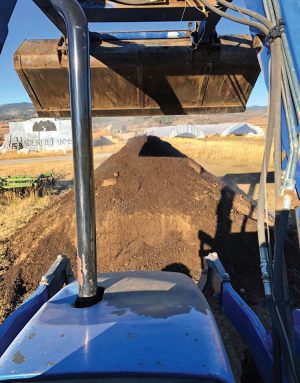
WyoFarm combines food waste with purchased wood chips, which is then composted in windrows and turned with a tractor. Finished compost (above) is used on the farm and sold to homeowners and landscapers. Photos courtesy of Haderlie Farms
At the start of the program, the Lodge’s food waste loads had an average of 10 percent contamination. To tackle the problem, a control system was implemented in which the food and beverage staff, including the director, and the hauler, inspected loads for contamination. In addition, stewards were asked to remove any visible contamination. After observing the food waste loads, the Lodge realized how much more edible food they could utilize instead of compost. For example, it now uses scraps from steak cuts to make tacos in the employee cafeteria, and vegetable cuts to make vegetable broths.
Wyofarm Composting
As the program completed its first year, a new challenge arose. In 2018, the WYCF reached the threshold amount it could accept from Grand Teton concessionaires on a weekly basis. At that point, the Zero Landfill Initiative had added another lodge to the program, increasing its weekly food waste tonnage. In addition to that, seeing how much food waste tonnage was diverted from the GTNP, the Yellowstone National Park increased its efforts to divert that material, which significantly increased the tonnage processed at the WYCF.
Fortunately, at the same time, one of the Lodge’s local produce suppliers was starting a new commercial food waste composting facility — WyoFarm Composting (WyoFarm) — 85 miles away from the Lodge.
WyoFarm is part of Haderlie Farms, family-owned and operated since 1945 in Thayne, Wyoming. Haderlie Farms grows herbs, flowers and vegetables. It is also raises cattle, hogs and sheep, and produces raw milk and honey. The farm was already collecting food scraps from various businesses in Jackson (WY) to feed its pigs. Since only vegetable scraps were fed to the pigs, the remaining food waste was composted on-site to provide soil amendment for the farm’s own use.
Haderlie Farms owners, Curtis and Karen Haderlie, explain that “soon we realized the benefits of composting, including little or no need for pesticide use, better water retention and soil restoration, and expanded our operations creating our commercial composting facility.” WyoFarm Composting has a Wyoming Department of Environmental Quality permit exemption to operate on a 7-acre area within the farm, with capacity for up to 10,000 cubic yards on site at any one time of fresh food scraps and finished product.
WyoFarm Composting combines the food waste with purchased wood chips, which are then placed in windrows and turned with a tractor. It takes about two months during the summer for the process to be completed. The material then cures for another two months. During the winter months, the material remains in piles until the weather changes and it can be processed. All final product is screened before being applied to the land or sold.
Haderlie states the benefits of the compost are visible in their produce — it has better visual appearance, tastes better, and lasts longer in the refrigerator. “Our compost is rich and soft, is high in organic matter, and contains a broad spectrum of stable nutrients to feed the biology in the soil,” notes Haderlie. He has observed reduced crop diseases and insects. “Our farm’s main product is nutrient-dense food, and quality compost helps us accomplish that,” he adds.
WyoFarm collects and processes residential and commercial food waste, as well as accepts loads collected by haulers. It also has a residential food waste drop-off site at the farm. All food waste is accepted, along with coffee grounds and filters, teabags without staples, napkins, food-soiled paper, wax paper, muffin liners, and pet hair. All materials are collected without any bags, including compostable bags. WyoFarm does not accept food waste mixed with yard trimmings, because of the wide use of pesticides on lawns.
Its materials handling process is labor-intensive — from collecting and receiving to cleaning and processing the material. Contamination in incoming loads is removed by hand. The most common contaminants are disposable gloves and aluminum cans. All loads with glass contamination are rejected. WyoFarm provides education outreach and training to participating food waste generators, warning that fines will be assessed with persistent contamination issues.
Food waste is currently collected from 25 commercial locations and 60 residential locations in 5-gallon buckets or 32-gal carts only. The full 5-gallon buckets are swapped with clean buckets during collection. WyoFarm does not clean the 32 gal carts; it is the participants’ responsibility to clean them. A dump trailer with a cart tipper is used for food waste collection. The route collection doesn’t require a minimum of participating sites as the farm uses the same truck to deliver milk and food to its regular customers three days per week. If residential customers choose, they can receive the new bucket filled with compost. The farm also offers an incentive for residents to compost with them. If the resident buys $20/week of produce from the farm, their food scraps drop-off fee is waived.
Large quantities of compost also are delivered on-site to homeowners and landscapers. Haderlie says that local retailers are suggesting the farm bag the compost for sale at their stores.
WyoFarm has extended its education outreach, offering composting training sessions at its stand at the local People’s Market, and at local nonprofit organizations engaged in similar efforts to increase awareness about organics diversion through composting. Demand for WyoFarm’s services is rapidly increasing as more local businesses and residents become aware of the importance of food waste diversion and the benefits of composting.
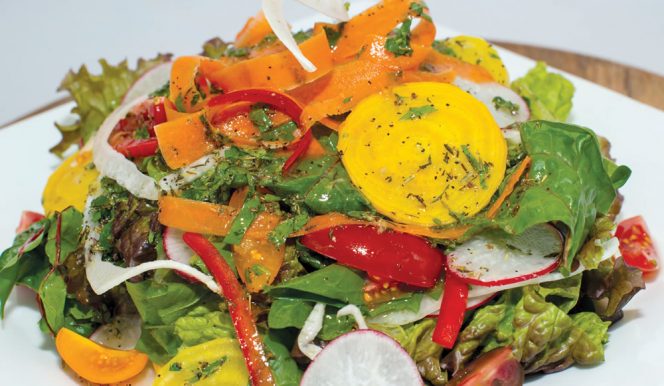
Signal Mountain Lodge’s Peaks Restaurant serves seasonal produce grown by Haderlie Farms — also the Lodge’s composting service provider. Photo courtesy the Vox Agency
Closed Loop Program
Haderlie Farms donates food that is not sold at its People’s Market booth to Hole Food Rescue, a local nonprofit whose mission is to reduce food waste and food insecurity in the Jackson community. It also partners with the USDA Supplemental Nutrition Assistance Program (SNAP) on its Slow Food Bucks Veggie Voucher Program for food purchase at the People’s Market, making local health food accessible and affordable for low income and food insecure members of the community.
This effective partnership between Signal Mountain Lodge, Haderlie Farms, the Subaru of America-sponsored Zero Landfill Initiative, and Road to Zero Waste in Teton County has resulted in a closed loop food waste diversion program. Through the implementation of source reduction, food donation to feed people and animals, and composting, the program has brought both social and environmental benefits to the Teton region.
Ana Carvalho, MS, Environmental Specialist, is a Contributing Editor to BioCycle.



